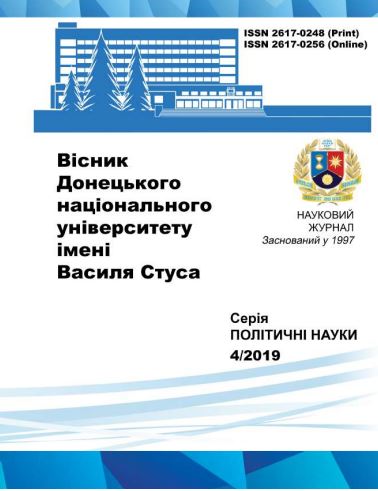Official political discourse texts as an indicator of the political regime evolution (by the mean of speeches of Ukrainian presidents).
DOI:
https://doi.org/10.31558/2617-0248.2019.4.14Keywords:
political regime, political speech, genres of political speeches, audiences of political speeches, Ukrainian presidentsAbstract
In Ukrainian scientific discourse politics’ speeches are predominantly studied within political linguistic. Primarily scholars pay their attention at foreign politician speeches. Additionally, qualitative methods are usually used, and there is almost impossible to measure political processes’ dynamics for large periods of time.
In the paper 856 speeches of Ukrainian presidents (Yuschenko, Yanukovych, Poroshenko) are studied – all the speeches for the whole period of presidency. With the formal analysis oscillations of different parameters in the political texts, due to changes of political regimes is demonstrated.
The main hypothesis of the study is the interrelation between more intense and diverse (in the terms of genres, formats of events, informational occasions, audiences, geography) communication and more democratic regime. The first part of the hypothesis was partly approved. Simple count of the quantity of the speeches shows, that low intensity of speeches was observed only during the first two years of Yanukovych presidency. The second part of the hypothesis was approved.
Yuschenko’s and Poroshenko’s speechwriters used not only main genres of speeches (statements, appeals and etc), but subgenres as well. Additionally it is stressed, that in the Ukrainian scientific tradition genres of direct appeals aren’t studied enough.
The third and the fifth Ukrainian presidents’ teams created more diverse and unique actions formats (29 and 39 respectively; 18 for Yanukovych). Information occasions were mostly connected with current affairs, whereas in the Yanukovysh case historical and calendar occasions prevailed (58,7% historic and calendar occasions for Yanukovych, 46,3% Yuschenko, 44,9% Poroshenko).
As for audiences, there are three the most popular recipients for all the presidents (people, international institutions, and parliament). However, the difference is in the attention distribution and the bigger number of audiences mentions in democratic leaders’ speeches. Geographic names mentions analysis shows different approaches towards international blocks (the Western countries and more democratic countries for the democratic leaders; the CIS countries and more authoritative countries for Yanukovych).
References
Баровська А., Коваль І. Архів промов президента як чинник реалізації публічності інституту президентства. Актуальні проблеми державного управління, 2013. № 3. С. 39-44.
Гузак А. М. Типологічні особливості вживання прецедентних імен у політичній ораторській промові (на матеріалі промов американских президентів). Одеський лінгвістичний вісник, 2014. № 4. С. 56-59.
Заблоцький Ю. В. Аналіз передвиборчих промов кандидатів у президенти США у 2012 році (М. Ромні та Б. Обама). Одеський лінгвістичний вісник, 2015. № 5(1). С. 57-62.
Земская Ю., Кузнецова, Е. Спичрайтинг и копирайтинг: филология на службе интегрированных маркетинговых технологий. Филология и человек, 2014. С. 1-6.
Казанцева М. С. Спичрайтинг как технология подготовки политических текстов. Бизнес. Общество. Власть, 2010. № 5. С. 25-39.
Кльось С. Семантичні особливості функціонування фразеологізмів у політичному дискурсі (на основі промов діячів англійською мовою). Молодь і ринок, 2012. № 1. С. 106-110.
Куліш Т. В. Параноїдний стиль в американському політичному дискурсі (на матеріалі промов Джозефа МакКарті). Мовні і концептуальні картини світу, 2014. № 50(1). С. 421-427.
Лосєва І. Мовностилістичні ознаки політичних промов. Нова філологія, 2012. № 50. С. 64-66.
Мацишина І. В. Формування політичної реальності України. Київ: ТОВ «Твори», 2019. – 376 с.
Скрипникова Н. Спичрайтинг в политическом дискурсе (на примере публичных выступлений президента РФ). Язык: история и современность, 2017. № 2. С. 92-100.
Тхір М. Б. Новорічна політична промова як жанр публічного виступу (на матеріалі промов американських президентів). Мова і культура, 2011. № 6(14). С. 232-236.
Федорченко Л. Спичрайтинг как форма политического консалтинга в современной России. Вестник МГОУ, 2012. № 2. С. 155-161.
Холод, О. М. Соціо- та психолінгвістичні маркери імперативів у текстах промов керівників III Рейху як ознаки інмутації соціальної реальності. Психолінгвістика, 2016. № 19(2). С. 122-138.
Худолій А. О. Картина світу американських політиків (на матеріалі промов президентів США). Наукові записки Національного університету "Острозька академія". Серія : Філологічна. 2014. № 46, С. 208-211.
Чепкасов А. Супра- и топографематические средства в практике спичрайтинга: на примере текстов выступлений губернатора Кемеровской области. Коммуникативные исследования, 2018. № 3(17), С. 211-225. DOI: 10.25513/2413-6182.2018.3.211-225
Швецова В. Види судових промов та їх особливості. Науковий вісник Південноукраїнського національного педагогічного університету імені К. Д. Ушинського. Лінгвістичні науки, 2017. № 24. С. 95-100.
Bayram F. Ideology and Political Discourse: a Critical Discourse Analysis of Erdogan's Political Speech. Annual Review of Education, Communication and Language Sciences, 2010. №7. С. 23-40.
Chang P. Discourse Analysis of President's Bush Speech at Tsinghua University, China. Intercultural Communication Studies, 2007. № 16(1). С. 205-216.
Habwe J. H. Discourse analysis of Swahili Political Speeches. Nairobi: University of Nairobi, 1999. 379 р.
Murphy J. "Our Mission and Our Moment": George W. Bush and September 11th. Rhetoric and Public Affairs, 2003. № 6(4). С. 607-632.
Wang J. A Critical Discourse Analysis of Barack Obama's Speeches. Journal of Language Teaching and Research, 2010. № 1(3). С. 254-261.

